第三次上机作业
task 1
#include <stdio.h> #include <stdlib.h> #include <time.h> #include <windows.h> #define N 80 void print_text(int line, int col, char text[]); void print_spaces(int n); void print_blank_lines(int n); int main() { int line, col, i; char text[N] = "hi, April~"; srand(time(0)); for(i = 1; i <= 10; ++i) { line = rand() % 25; col = rand() % 80; print_text(line, col, text); Sleep(1000); } system("pause"); return 0; } void print_spaces(int n) { int i; for(i = 1; i <= n; ++i) printf(" "); } void print_blank_lines(int n) { int i; for(i = 1; i <= n; ++i) printf("\n"); } void print_text(int line, int col, char text[]) { print_blank_lines(line-1); print_spaces(col-1); printf("%s", text); }
程序实现的功能:在0~24行与0~79列范围内随机打印十次“hi,April~”。
task 2
#include <stdio.h> #include<stdlib.h> long long fac(int n); int main() { int i, n; printf("Enter n: "); scanf("%d", &n); for (i = 1; i <= n; ++i) printf("%d! = %lld\n", i, fac(i)); system("pause"); return 0; } long long fac(int n) { static long long p = 1; p = p * n; printf("p = %11d\n",p); return p; }
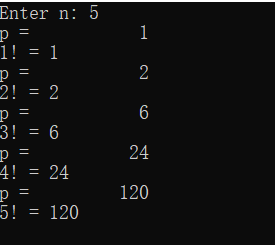
#include <stdio.h> #include<stdlib.h> int func(int, int); int main() { int k = 4, m = 1, p1, p2; p1 = func(k, m); p2 = func(k, m); printf("%d, %d\n", p1, p2); system("pause"); return 0; } int func(int a, int b) { static int m = 0, i = 2; i += m + 1;// (1) i = 2 + 0 + 1 = 3 (2) i = 3 + 8 + 1 = 12 m = i + a + b;// (1) m = 3 + 4 +1 = 8 (2) m = 12 + 4 + 1 = 17 return m; }

总结 :1.局部static变量在程序执行到声明处时候被首次初始化,以后的函数调用将不再进行初始化
2.它始终驻留在全局数据区,直到程序运行结束。但其作用域为局部作用域,当定义它的函数或语句结束时,其作用域随之结束。
task 3
#include <stdio.h> #include<stdlib.h> long long func(int n); int main() { int n; long long f; while (scanf("%d", &n) != EOF) { f = func(n); printf("n = %d, f = %lld\n", n, f); } system("pause"); return 0; } long long func(int n) { if (n==1) return 1; else return func(n-1)*2 + 1; }
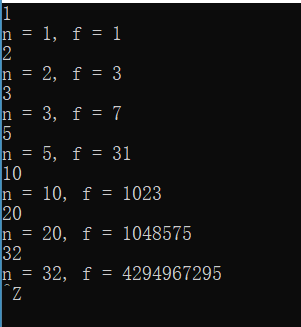
task 4
#include <stdio.h> #include<stdlib.h> int func (int n, int m); int main() { int n, m; while(scanf("%d%d", &n, &m) != EOF) printf("n = %d, m = %d, ans = %d\n", n, m, func(n, m)); system("pause"); return 0; } int func (int n,int m) { if(n == m||m == 0) return 1; if(m>n) return 0; else return func(n-1,m)+func(n-1,m-1); }
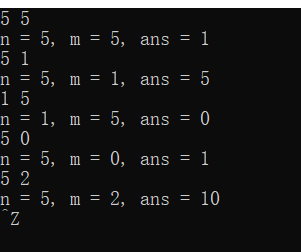
task 5
#include <stdio.h> #include<stdlib.h> double mypow(int x, int y); int main() { int x, y; double ans; while(scanf("%d%d", &x, &y) != EOF) { ans = mypow(x, y); printf("%d的%d次方 : %g\n\n", x, y, ans); } system("pause"); return 0; } double mypow(int x,int y) { int s=1,i,k; double ans = 1; if(y>=0){ for(i=1;i<=y;i++) { s = s*x; } return s;} else for(k=1;k<=-y;k++) ans = ans/x; return ans; }
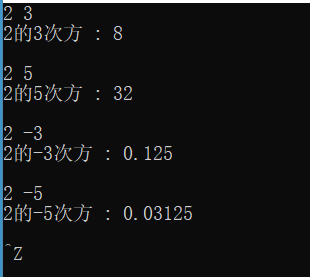
#include <stdio.h> #include<stdlib.h> double mypow(int x, int y); int main() { int x, y; double ans; while(scanf("%d%d", &x, &y) != EOF) { ans = mypow(x, y); printf("%d的%d次方 : %g\n\n", x, y, ans); } system("pause"); return 0; } double mypow(int x,int y) { if (y>=0){ if (y == 0) return 1; else return x*mypow(x,y-1); } if(y<0) if (y == 0) return 1; else return 1/mypow(x,-y); }
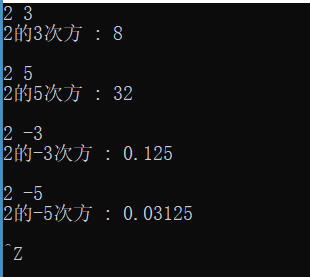
task 6
#include<stdio.h> #include<stdlib.h> void hanoi(unsigned int n,char from,char temp,char to); void moveplate(unsigned int n,char from,char to); unsigned int i = 0; int main() { unsigned int n; while(scanf("%u",&n)!=EOF) { i = 0; hanoi(n,'A','B','C'); printf("一共移动了%u次\n",i); } system("pause"); return 0; } void hanoi(unsigned int n,char from,char temp,char to) { if(n==1) moveplate(n,from,to); else { hanoi(n-1,from,to,temp); moveplate(n,from,to); hanoi(n-1,temp,from,to); } } void moveplate(unsigned int n,char from,char to) { printf("%u:%c-->%c\n",n,from,to); i++; }
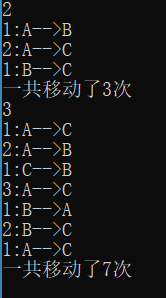
task 7
#include<stdio.h> #include<math.h> #include<stdlib.h> int is_prime(int x); int main() { int s,i; while(scanf("%d",&s)!=EOF){ for(i=2;i<=s*1.0/2;i++) { if(is_prime(i)&&is_prime(s-i)){ printf("%d = %d + %d\n",s,i,s-i); break; } } } system("pause"); return 0; } int is_prime(int x) { int i,k; k = sqrt(1.0*x); for(i=2;i<=k;i++) if(x%i==0) return 0; if(i>k) return 1; }
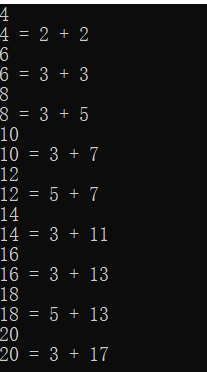
task 8
#include <stdio.h> #include <math.h> #include<stdlib.h> long func(long s); int main() { long s, t; printf("Enter a number: "); while (scanf("%ld", &s) != EOF) { t = func(s); printf("new number is: %ld\n\n", t); printf("Enter a number: "); } system("pause"); return 0; } long func(long s) { long ans,z=0,q=0,j; for(;s!=0;) { ans = s % 10; s = s / 10; if(ans%2 != 0) z = z*10 +ans; } for(;z!=0;) { j = z % 10; z = z/10; q = q*10 + j; } return q; }
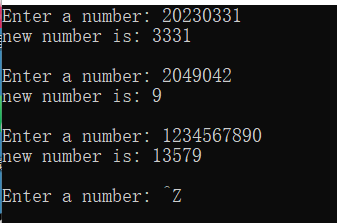




 浙公网安备 33010602011771号
浙公网安备 33010602011771号